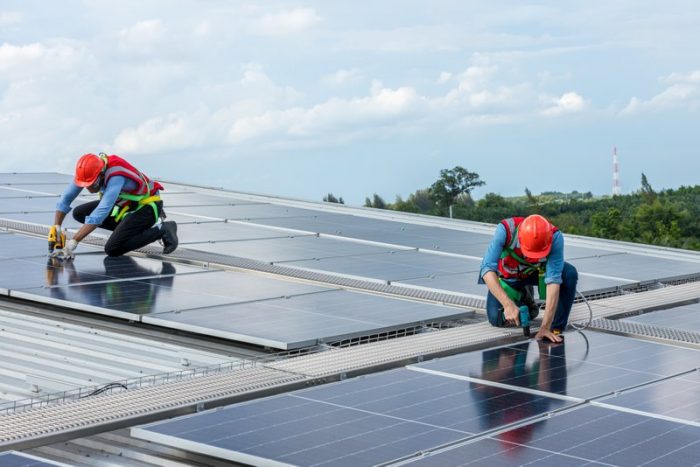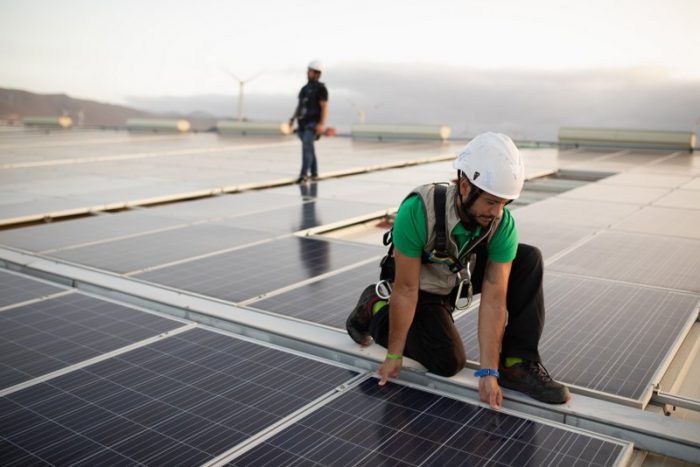
It’s that time of year when resolutions are formed, and often fail soon thereafter. For Ted Fawcett, cofounder and CEO of commercial solar lender Orka Finance, resolutions began not with the start of a new year, but with the end of a sabbatical. He resolved to create a business that addressed a meaningful problem in a mindful way. And, more than one year in, he’s sticking to his resolution.
When Fawcett left his role as EVP of sales at Mosaic for a self-imposed sabbatical, it was, in part, to spend time with his three daughters before they were old enough to find their parents an embarrassment.
“I don’t know how long we go in life, but I didn’t want to get to the end of it and look back and say, I missed out on so many things that my family was doing simply because of work,” he said.
His sabbatical was also a chance to reflect on his now 13 years in solar. There were things he knew and loved — solar and finance — but there were also flaws he saw that needed addressing.
“I started to interview contractors and developers and get a sense of what was working and what wasn’t working for them,” Fawcett said. Teaming with Dan Rosen, founder and chairman of Mosaic, they formulated some ideas.
He emerged with a mission: To make commercial solar as easy to finance as residential solar. However, his vision of how the company would operate was as important to him as what the company would do. He set out to build a business on four pillars: A motivating team culture, a fast and unbiased technology platform, strong contractor relationships and trusted capital sources.
Fixing C&I financing flaws
C&I solar has always been the weak point in the industry’s lending landscape. Residential solar has been a competitive market with leases and loans offered by companies such as Sunrun and Vivint for their own portfolio, and Mosaic and GoodLeap for homeowners using independent installers. Utility-scale solar is propelled by an efficient project finance market with deep-pockets of debt, equity and tax equity.
Commercial solar lending? It’s been opaque and inefficient, to put it mildly.
“We heard from residential contractors that many of them have tried to get into small commercial and it’s not the installation complexity that holds them out, it’s the fact that they are used to a credit and lending experience that is instantaneous,” Fawcett said. “When they can’t get that, they say it’s not worth it for them, and they will stick to residential.”
For contractors who focus on C&I, Fawcett said many leave smaller deals on the table because the financing is hard to get and credit decisions are slow: “Many businesses out there have set thresholds where they say they will not go below 100 kW or 50 kW because it’s not worth it for them.”
The clunky commercial solar lending environment has created a hurdle. “What exists today is predominantly a bank-driven experience. And banks do a lot of things well, but rapidly credit-decisioning small businesses is not one of them,” Fawcett said. In addition, the loans that do eventually get issued by banks often don’t match well with the 25-year lifespan of solar assets. The result is a market ripe for disruption.
The Orka model
Orka differentiates itself by offering near-instantaneous credit decisions for C&I customers, enabling contractors to quickly determine whether they can serve them.
It focuses on loans: “Historically, the predominant commercial financing has been lease or PPA for small businesses,” Fawcett said. “There’ll always be a place for that type of offering, but you could have said the same about the residential space back in 2013.”
In residential solar, “there’s been a pretty rapid migration to ownership. Seventy-plus percent of homeowners are owning their system with a loan. We see the same thing happening in the commercial space,” Fawcett said.
The company’s suite of loan products is similar to those in the residential space, with loan terms of five to 20 years and, while interest rates are not as low as residential loans, they are “really reasonable for the asset class,” Fawcett said, allowing businesses to see savings from the beginning.
Orka’s core offering is the solar loan, whether roof mount, ground mount or carport canopy, but can cover anything related to the system. “They can wrap in batteries, EV charging, reroofing, electrical upgrades, structural upgrades… we’re also looking at wrapping in LED lighting and heat pumps,” he said. “Increasingly, [businesses] are looking for energy efficiency measures on top of solar and storage. We know that it’s a better experience for the borrower where it’s one loan payment.”
Orka finances projects up to a million dollars in value and serves 35 states today. By the end of 2023, Orka will offer loans in all 50 states.
“In 2022, we fielded more requests for more than $25 million in loans, with increasing demand since emerging from stealth in September,” Fawcett said.

Starting with a team
Once the concept was locked, Fawcett set out to “build a company with purpose that we can feel good about, but that doesn’t trade against the lives we have at home and the relationships we have elsewhere.” He invested in some of the less tangible aspects from the start, rather than waiting until there was significant cash flow.
“There were obviously a ton of problems to solve when you’re building a company from scratch,” he said. “But the first was assembling a great team. And we’ve nailed that. We’re investing heavily in the culture, because we think that if you start with a great team and you build a great culture, that you can build something really impactful from that.”
The team members — who introduce themselves on the company’s site with haikus — aren’t expected to make sacrifices typical in start-ups. Fawcett said the company’s chief financial officer and cofounder Connie Chern “helped us think through ways where we can invest from day one in our employees in a way that you would expect with a publicly traded company, a well-capitalized company.”
Creating a technology platform
While a good team is important, an efficient technology platform is essential for scaling the business. “This is about delivering better commercial lending through technology,” Fawcett said.
Once a customer applies, the technology leverages APIs — Application Programming Interfaces that enable Orka to “plug into” other systems — and various services to assess the business, the principals, the property and to render a credit decision instantaneously or within 24 hours.
Easy applications and fast approvals make it economic for contractors to serve even small businesses. “We’re compressing that financing credit cycle into one that really helps contractors accelerate the right customers through the process,” he said.
Programming bias out of the process
Traditionally, it has been harder for woman and those in black, indigenous, people of color (BIPOC) communities to access competitive loans for capital improvements such as adding solar or upgrading a building’s energy efficiency.
“We wanted to be mindful about that from day one and not have this be something that we think about down the line,” Fawcett said. He was conscious of the need to build equity into not only the company’s culture, but also its lending program from the start. And that meant ensuring the technology didn’t undermine the goals.
Fawcett started with getting a deeper understanding of the challenges: “We commissioned a study with the University of California, Berkeley, to better understand what the barriers are to providing financing to BIPOC- and women-led businesses.”
Bias in the lending environment has been well documented, such as in a 2017 U.S. Federal Reserve study that found black business owners were turned down for loans at a rate twice as high as their white counterparts. Studies have also found the biases can be built into lending algorithms, even if unintentionally, by being built on historic data that reflects past discrimination.
As Adair Morse, a finance professor at the Haas School of Business and co-author of a study on algorithmic bias in mortgage lending said in a U.C. Berkeley release: “The mode of lending discrimination has shifted from human bias to algorithmic bias. Even if the people writing the algorithms intend to create a fair system, their programming is having a disparate impact on minority borrowers — in other words, discriminating under the law.”
Fawcett was committed to creating a technology platform with fairness built into its algorithms: “The technology-driven process that we built at Orka strips out bias in terms of credit underwriting and with it, and some extra effort on our part, we can make financing more available for businesses that want to save money,” he said.
Courting contractors
The third pillar Fawcett focused on was perhaps the easiest: building strong relationships with contractors.
With such an obvious gap in the market, there has been very strong contractor demand. Like residential lending programs, Orka has a multi-tiered risk strategy, so it does due diligence on installers before assessing any end-customer’s credit. “We work with high quality installers, and they’ve got to meet certain standards to get access to our financing,” he said.
Fawcett added that there is strong interest from both residential contractors and those servicing larger C&I customers, both of which see an efficient lending process as key to serving smaller commercial clients cost effectively.
With residential contractors, he said, “We feel like we’re opening up a segment a market that’s already mobilized for this.”
For commercial developers, he said, “There’s a ton of benefit in terms of increased deal flow for them. Their sales reps and their team stay more fully utilized, and it’s not so lumpy for them compared to a big project every couple of months.”
Making capital connections
Behind the scenes, Orka’s success depends upon securing strong relationships with capital sources, the institutions that will buy, hold or fund the loans.
Orka is, for many of the capital providers, streamlining a process they don’t do well. “We partner very nicely with banks where we can be that front end for them,” Fawcett said. For other institutional investors, Orka opens the doors to an asset class that they couldn’t otherwise access.
Those capital providers look to Orka to make credit decisions with the same standards they would use, whether underwriting small businesses or funding projects for established companies with larger balance sheets.
New year, new markets?
With a national market strengthened by the Inflation Reduction Act, resolving to grow your solar business this year seems obvious, though contractors in some states face regulatory headwinds. The question is how. It could be the right time to expand into new markets, whether you are a residential installer wanting to serve a larger market or a commercial developer looking to serve the smaller end of the market profitably. Either way, the entrance of new commercial solar lending offerings should make that growth easier.
Dej Knuckey is a contributor to Solar Builder. She is a journalist, author and freelance writer who has covered energy for publications in Australia and the U.S.
— Solar Builder magazine
[source: https://solarbuildermag.com/featured/orka-approach-to-commercial-solar-financing/]
Leave a Reply
You must be logged in to post a comment.